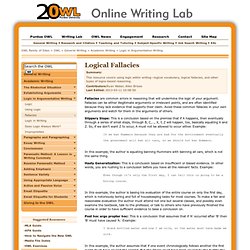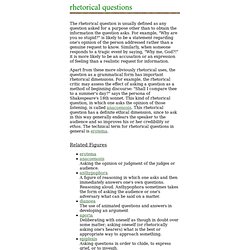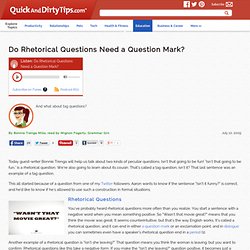

Logic in Argumentative Writing. Summary: This resource covers using logic within writing—logical vocabulary, logical fallacies, and other types of logos-based reasoning.

Contributors:Ryan Weber, Allen BrizeeLast Edited: 2013-03-11 10:08:50 Fallacies are common errors in reasoning that will undermine the logic of your argument. Fallacies can be either illegitimate arguments or irrelevant points, and are often identified because they lack evidence that supports their claim. Avoid these common fallacies in your own arguments and watch for them in the arguments of others. Slippery Slope: This is a conclusion based on the premise that if A happens, then eventually through a series of small steps, through B, C,..., X, Y, Z will happen, too, basically equating A and Z. If we ban Hummers because they are bad for the environment eventually the government will ban all cars, so we should not ban Hummers. In this example, the author is equating banning Hummers with banning all cars, which is not the same thing. Taxonomy of the Logical Fallacies.
Errors in Reasoning List of Definitions. The Beatles Teach Logical Fallacies Pt. I. Rhetorical questions. The rhetorical question is usually defined as any question asked for a purpose other than to obtain the information the question asks.

For example, "Why are you so stupid? " is likely to be a statement regarding one's opinion of the person addressed rather than a genuine request to know. Similarly, when someone responds to a tragic event by saying, "Why me, God?! " it is more likely to be an accusation or an expression of feeling than a realistic request for information. Apart from these more obviously rhetorical uses, the question as a grammatical form has important rhetorical dimensions. Related Figures erotema anacoenosis Asking the opinion or judgment of the judges or audience. anthypophora A figure of reasoning in which one asks and then immediately answers one's own questions. Do Rhetorical Questions Need a Question Mark? Today guest-writer Bonnie Trenga will help us talk about two kinds of peculiar questions.

Isn’t that going to be fun! "Isn't that going to be fun," is a rhetorical question. We’re also going to learn about its cousin. That’s called a tag question, isn’t it? That last sentence was an example of a tag question. This all started because of a question from one of my Twitter followers. Rhetorical Questions You’ve probably heard rhetorical questions more often than you realize. Another example of a rhetorical question is “Isn’t she leaving?” Rhetorical questions have popped up in pop music. “Isn't she lovely, Hypophora - definition and examples of hypophora - rhetorical terms. Fallacies. What this handout is about This handout discusses common logical fallacies that you may encounter in your own writing or the writing of others.
The handout provides definitions, examples, and tips on avoiding these fallacies. Arguments. Logical Fallacies. Logic in Argumentative Writing. Handouts about Revision.